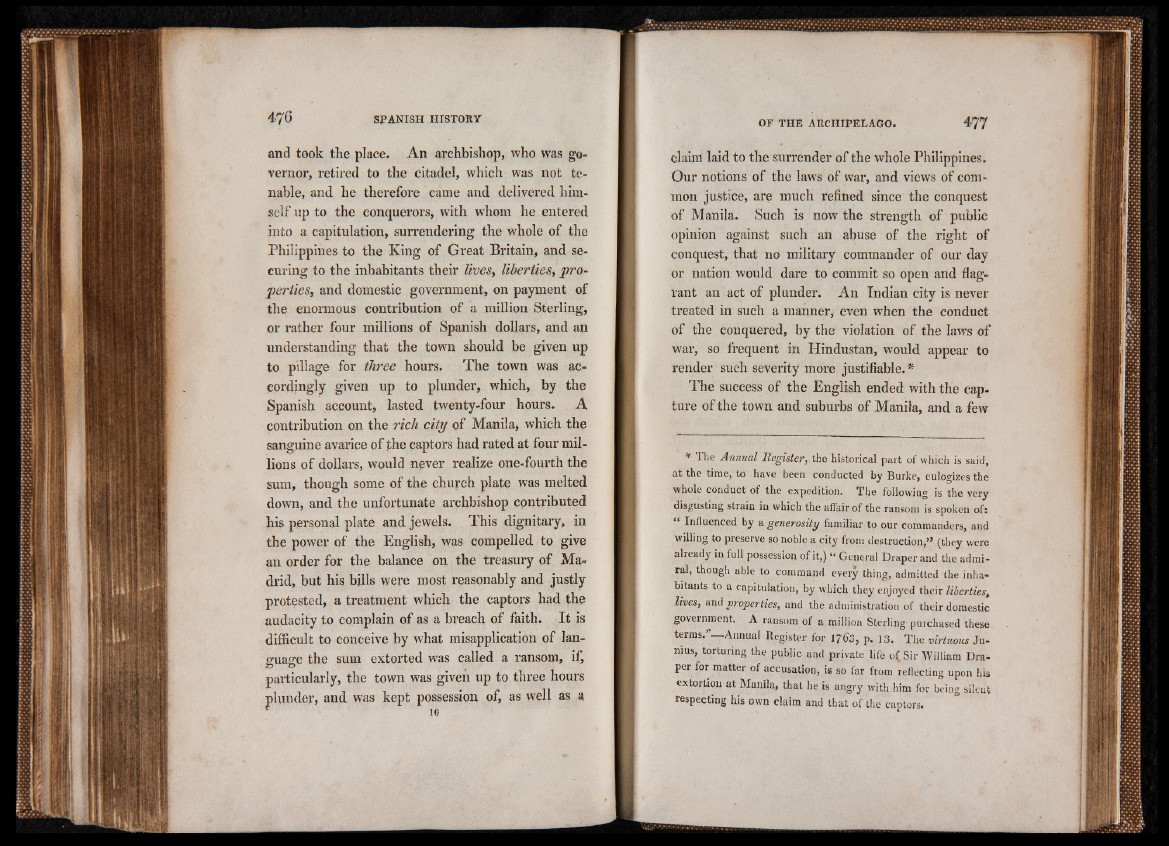
and took the place. An archbishop, who was governor,
retired to the citadel, which was not tenable,
and he therefore came and delivered himself
up to the conquerors, with whom he entered
into a capitulation, surrendering the whole of the
Philippines to the King of Great Britain, and securing
to the inhabitants their lives, liberties, properties,
and domestic government, on payment of
the enormous contribution of a million Sterling,
or rather four millions of Spanish dollars, and an
understanding that the town should be given up
to pillage for three hours. The town was accordingly
given up to plunder, which, by the
Spanish account, lasted twenty-four hours. A
contribution on the rich city of Manila, which the
sanguine avarice of the captors had rated at four millions
of dollars, would never realize one-fourth the
sum, though some of the church plate was melted
down, and the unfortunate archbishop contributed
his personal plate and jewels. This dignitary, in
the power of the English, was compelled to give
an order for the balance on the treasury of Madrid,
but his bills were most reasonably and justly
protested, a treatment which the captors had the
audacity to complain of as a breach of faith. It is
difficult to conceive by what misapplication of lan-
cmaffe the sum extorted was called a ransom, if,
particularly, the town was given up to three hours
plunder, and was kept possession of, as well as a
10
claim laid to the surrender of the whole Philippines.
Our notions of the laws of war, and views of common
justice, are much refined since the conquest
of Manila. Such is now the strength of public
opinion against such an abuse of the right of
conquest, that no military commander of our day
or nation would dare to commit so open and flagrant
an act of plunder. An Indian city is never
treated in such a manner, even when the conduct
of the conquered, by the violation of the laws of
war, so frequent in Hindustan, would appear to
render such severity more justifiable. *
The success of the English ended with the capture
of the town and suburbs of Manila, and a few
* The Annual Register, the historical part of which is said,
at the time, to have been conducted by Burke, eulogizes the
whole conduct of the expedition. The following is the very
disgusting strain in which the affair of the ransom is spoken of:
1 Influenced by a generosity familiar to our commanders, and
willing to preserve so noble a city from destruction,” (they were
already in full possession of it,) “ General Draper and the admiral,
though able to command every thing, admitted the inhabitants
to a capitulation, by which they enjoyed their libertiest
lives, and properties, and the administration of their domestic
government. A ransom of a million Sterling purchased these,
terms.”— Annual Register for 1763, p. 13. The virtuous Junius,
torturing the public and private life of. Sir William Draper
for matter of accusation, is so far from reflecting upon his
extortion at Manila, that he is angry with him for being silcut
respecting his own claim and that of the captors.